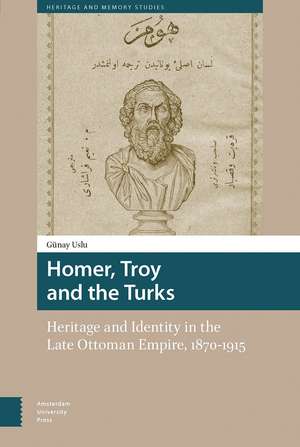Homer, Troy and the Turks – Heritage and Identity in the Late Ottoman Empire, 1870–1915: Heritage and Memory Studies
Autor Günay Usluen Limba Engleză Hardback – 15 oct 2017
Homer's stories of Troy are part of the foundations of Western culture. What's less well known is that they also inspired Ottoman-Turkish cultural traditions. Yet even with all the historical and archaeological research into Homer and Troy, most scholars today rely heavily on Western sources, giving Ottoman work in the field short shrift. This book helps right that balance, exploring Ottoman-Turkish involvement and interest in the subject between 1870, when Heinrich Schliemann began his excavations in search of Troy on Ottoman soil, and the battle of Gallipoli in 1915, which gave the Turks their own version of the heroic epic of Troy.
Din seria Heritage and Memory Studies
- 9%
 Preț: 889.10 lei
Preț: 889.10 lei - 9%
 Preț: 847.69 lei
Preț: 847.69 lei - 9%
 Preț: 819.69 lei
Preț: 819.69 lei - 27%
 Preț: 695.17 lei
Preț: 695.17 lei - 38%
 Preț: 556.30 lei
Preț: 556.30 lei - 38%
 Preț: 555.95 lei
Preț: 555.95 lei - 34%
 Preț: 555.95 lei
Preț: 555.95 lei - 34%
 Preț: 554.48 lei
Preț: 554.48 lei - 34%
 Preț: 554.85 lei
Preț: 554.85 lei - 25%
 Preț: 556.41 lei
Preț: 556.41 lei - 39%
 Preț: 550.63 lei
Preț: 550.63 lei - 40%
 Preț: 583.28 lei
Preț: 583.28 lei - 37%
 Preț: 642.67 lei
Preț: 642.67 lei - 18%
 Preț: 764.89 lei
Preț: 764.89 lei - 14%
 Preț: 731.37 lei
Preț: 731.37 lei
Preț: 639.40 lei
Preț vechi: 1012.35 lei
-37% Nou
Puncte Express: 959
Preț estimativ în valută:
122.35€ • 128.17$ • 101.40£
122.35€ • 128.17$ • 101.40£
Carte indisponibilă temporar
Doresc să fiu notificat când acest titlu va fi disponibil:
Se trimite...
Preluare comenzi: 021 569.72.76
Specificații
ISBN-13: 9789462982697
ISBN-10: 9462982694
Pagini: 220
Ilustrații: 9 color plates, 32 halftones
Dimensiuni: 163 x 236 x 21 mm
Greutate: 0.45 kg
Editura: Amsterdam University Press
Seria Heritage and Memory Studies
ISBN-10: 9462982694
Pagini: 220
Ilustrații: 9 color plates, 32 halftones
Dimensiuni: 163 x 236 x 21 mm
Greutate: 0.45 kg
Editura: Amsterdam University Press
Seria Heritage and Memory Studies
Notă biografică
Gunay Uslu is a researcher on European culture, heritage, and museum studies at the University of Amsterdam.
Cuprins
Preface and Acknowledgements
Introduction
I The Discovery of Troy
Schliemann and the Ottomans in the 1870s
1 The Question of ‘ubi Troia fuit’
2 Heinrich Schliemann in the Troad
3 Schliemann’s Confrontation with Ottoman Authorities
4 Ottomans Claiming Trojan Artefacts
5 Troy: A Protected Zone
6 Excavating in the Shadow of War
II Classical Antiquities and Ottoman Patrimony
The Muslim Elite and Their Involvement with Classical Civilization
1 Antiquities and Museum: Interests and Conflicts
2 Zeal for Civilization: Enlightened Ideas and Ideals in the Empire
3 The Cosmopolitan Muslim Elite of a Multifarious Empire
4 Osman Hamdi Bey: A New Era in Ottoman Archaeology and Museology
III A Closer Watch on Schliemann (1882-1885)
1 Profitable Political Conditions
2 The Excavations
3 The Ottoman Elite’s Displeasure with the Ineffective Antiquuities Law of 1874
4 New Antiquities Legislation (1884): Ottoman Claim to Ancient Heritage
IV Homer and Troy in Ottoman Literature
An Overview
1 Early Ottoman-Turkish Interest in the Homeric Epics
2 New Ottoman Literature: Educating the Public and Changing Perceptions
3 Mythology and Homer: Ottoman Reticence
4 Homer and Troy in Ottoman Essays, Books, Plays and the First Translations (1884-1908)
5 Admiration for the ‘Lord of Poets’
6 Izmir (Smyrna): Homer’s Hometown
V Homer and Troy during the Final Years of the Empire
1 Controlling Heritage and the Development of the Ottoman Museum
2 Schliemann’s Reputation under Fire
3 The Final Encounter of Schliemann and the Ottomans in Troy
4 Finding Troy Once More: Dörpfeld’s Excavations in 1893 and 1894
5 Overseeing Troy at the Turn of the Century
Epilogue of an Empire
Manuscript Sources
Bibliography
Index
Introduction
I The Discovery of Troy
Schliemann and the Ottomans in the 1870s
1 The Question of ‘ubi Troia fuit’
2 Heinrich Schliemann in the Troad
3 Schliemann’s Confrontation with Ottoman Authorities
4 Ottomans Claiming Trojan Artefacts
5 Troy: A Protected Zone
6 Excavating in the Shadow of War
II Classical Antiquities and Ottoman Patrimony
The Muslim Elite and Their Involvement with Classical Civilization
1 Antiquities and Museum: Interests and Conflicts
2 Zeal for Civilization: Enlightened Ideas and Ideals in the Empire
3 The Cosmopolitan Muslim Elite of a Multifarious Empire
4 Osman Hamdi Bey: A New Era in Ottoman Archaeology and Museology
III A Closer Watch on Schliemann (1882-1885)
1 Profitable Political Conditions
2 The Excavations
3 The Ottoman Elite’s Displeasure with the Ineffective Antiquuities Law of 1874
4 New Antiquities Legislation (1884): Ottoman Claim to Ancient Heritage
IV Homer and Troy in Ottoman Literature
An Overview
1 Early Ottoman-Turkish Interest in the Homeric Epics
2 New Ottoman Literature: Educating the Public and Changing Perceptions
3 Mythology and Homer: Ottoman Reticence
4 Homer and Troy in Ottoman Essays, Books, Plays and the First Translations (1884-1908)
5 Admiration for the ‘Lord of Poets’
6 Izmir (Smyrna): Homer’s Hometown
V Homer and Troy during the Final Years of the Empire
1 Controlling Heritage and the Development of the Ottoman Museum
2 Schliemann’s Reputation under Fire
3 The Final Encounter of Schliemann and the Ottomans in Troy
4 Finding Troy Once More: Dörpfeld’s Excavations in 1893 and 1894
5 Overseeing Troy at the Turn of the Century
Epilogue of an Empire
Manuscript Sources
Bibliography
Index
